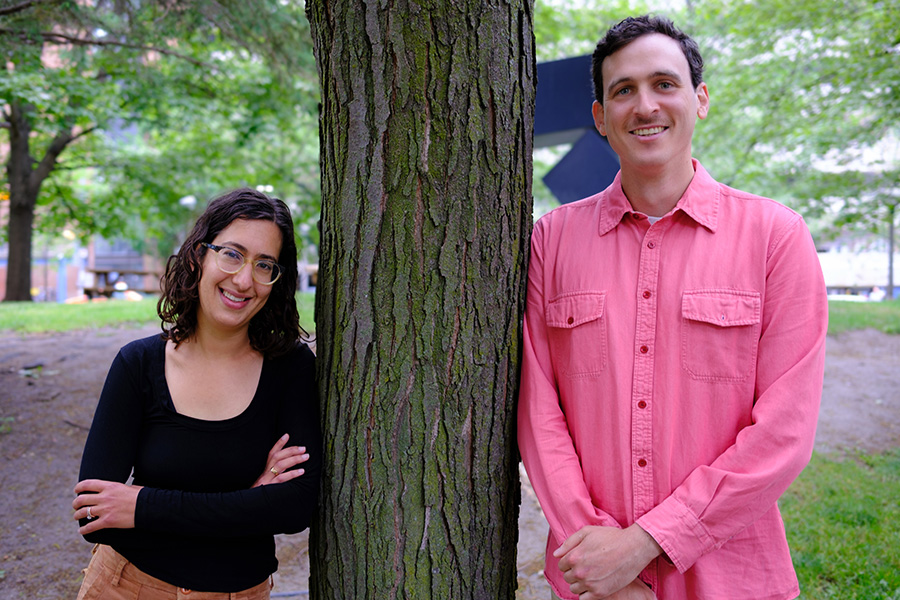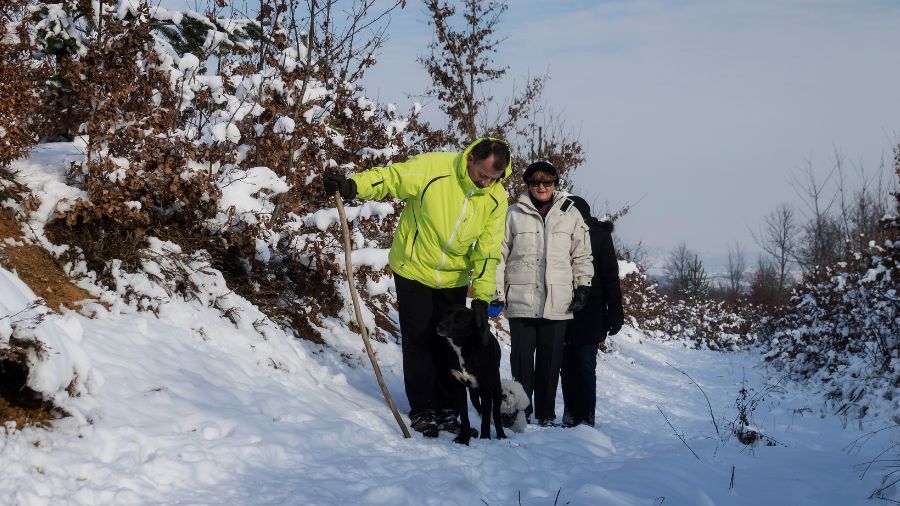
Ongoing forest fires in Quebec and Ontario have brought unprecedented amounts of smoke to Toronto, increasing concerns about the health impacts of the climate crisis.
While government advisories warned of physical health risks posed by wildfire smoke events, they also acknowledged possible mental health consequences, offering resources for those experiencing anxiety, stress and isolation.
This recognition of the impacts the climate crisis can have on psychological well-being is a welcome development for Drs. Sarah Levitt and Daniel Rosenbaum, staff psychiatrists at UHN’s Centre for Mental Health, who have seen research on the health effects of the climate crisis shift beyond a focus on physical health in recent years.
“This is the largest existential threat of our time,” says Dr. Levitt. “It is going to have a big effect on mental health at a population level and we need to be prepared for that.”
In November 2018, the two started meeting with other psychiatrists to make sense of their own distress related to the climate crisis.
“We wanted to understand our responsibilities as mental health professionals and the role we have in supporting communities through this crisis,” says Dr. Rosenbaum.
Initially, their efforts focused on raising awareness about the mental health impacts of the climate crisis through educational rounds and conference presentations.
In preparing for these talks, they encountered approaches that emphasized social accountability and thinking beyond the individual patient level to include advocacy at institutional and systems levels. This perspective proved valuable in understanding how psychiatrists can address the issue at both a micro and macro level.
Canada warming at three times the global average
Motivated by similar initiatives in the United States and United Kingdom, Drs. Levitt and Rosenbaum, the two recently published a call to action statement in the Canadian Journal of Psychiatry.
“Given that Canada is warming at a rate three times faster than the global average, we felt it was crucial to develop a specific call to action for the Canadian context,” says Dr. Levitt, who believes psychiatrists, as trusted health care professionals, must use their voice to advocate for mitigation efforts and policy changes that can help individuals and communities adapt to the changing climate.
Their statement emphasizes the importance of mental health professionals acquiring “climate literacy” to understand the crisis, its drivers and its impact on human health. They advocate for the development of educational programs to ensure clinicians receive specialized training and stay up to date on advancements in clinical practice.
“Health professionals have a role to advocate for systems level policy changes that would protect structurally vulnerable people,” says Dr. Rosenbaum, citing youth, Indigenous peoples, climate migrants, land-based workers, people living in poverty and people living with severe and persistent mental illness as examples of groups that may warrant greater attention.
Additionally, they urge their colleagues to engage in advocacy efforts, support divestment from fossil fuels and rapid decarbonization, and promote sustainable practices, emphasizing that health care systems, through factors like facilities, pharmaceuticals, and anesthetic gases, contribute significantly to greenhouse gas emissions.
While terms such as “eco-anxiety” have emerged to describe distress caused by environmental turmoil, climate-related mental health is not currently considered a distinct specialty within psychiatry.
The two psychiatrists hope to empower mental health workers to integrate environmental determinants of health into their practice without creating new diagnostic categories.
“We run the risk of pathologizing people’s emotional response when we label any emotional experience as abnormal,” says Dr. Rosenbaum. “Pain, sadness, fear, grief, anger – these may be perfectly healthy and adaptive emotional responses to these distressing times.”
Climate crisis reveals structural vulnerabilities
Colleagues have responded positively to their work. Some express a desire to get involved in advocacy or mitigation efforts. Others request practical tips or suggestions on how to address the mental health impacts of climate change, or the physical health impacts which patients with mental disorders are at higher risk of experiencing.
In addition to educational efforts, Drs. Levitt and Rosenbaum are involved in climate-related research projects.
Together with colleagues at Unity Health Toronto, they are working on interventions to bolster resilience to extreme heat among people living with severe and persistent mental illness.
A recent paper examining the 2021 heat dome event in British Columbia that resulted in 619 heat-related deaths found that schizophrenia was the highest disease-related risk factor for mortality, surpassing kidney or heart disease and other physical illnesses. Disturbingly, poverty was identified as the single greatest risk factor for death during the extreme heat event.
“These are staggering findings,” says Dr. Rosenbaum. “Similar to the COVID pandemic, the climate crisis didn’t create structural vulnerabilities; it revealed them.”
Their project involves raising awareness among community mental health teams, displaying informational posters around boarding homes, providing education on how to conduct heat checks, and sharing template letters that clinicians can use to advocate for their patients to receive funding for air conditioners – which the doctors note can be life-saving devices.
The team hopes to work with advocacy groups to push for maximum residential temperature bylaws as well as improvements to municipal respite services during extreme heat and other climate-related events.
The two psychiatrists have also received a Canadian Institute for Health Research (CIHR) grant to establish the Pan-Canadian Research Network for Mental Health and the Climate Crisis, an incubator that will bring people from community organizations, academia and health care together to support one another in developing adaptation efforts. An initial meeting is scheduled for this fall.
“We need practical, useful solutions to provide comfort, respond to distress and ultimately use our privileged position as health care professionals to advocate for change,” says Dr. Levitt, who will be delivering a rounds presentation on the topic at Women’s College Hospital on December 7.
“When people join others in advocacy efforts, it can be beneficial for both planetary health and mental health as people feel less alone and more empowered,” says Dr. Rosenbaum.


